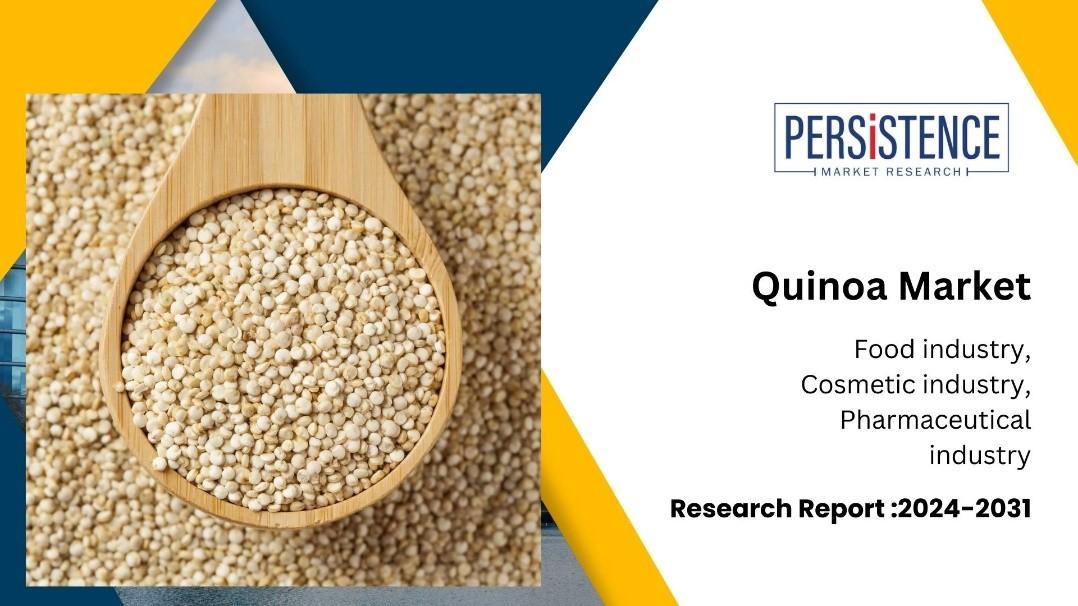In recent years, the term "superfood" has been used to describe foods with exceptional nutritional benefits. Among the superfood elite, quinoa has emerged as a true champion, celebrated for its versatility, nutritional value, and ability to fit seamlessly into various diets. But what exactly makes quinoa the hero of the modern diet? Let’s dive in and explore why this ancient grain has captured the attention of health enthusiasts around the world. The quinoa market is estimated to reach a valuation of US$2.3 Bn by 2031 from the value US$1.2 recorded in 2024. The market is estimated to secure a CAGR of 9.8% during the forecast period from 2024 to 2031. The rising fascination with natural and organic products within the cosmetic industry is set to boost the global quinoa market significantly. Additionally, the growing incorporation of quinoa into breakfast foods is expected to drive substantial growth in the quinoa market throughout the forecast period.

1. A Complete Protein Powerhouse
One of quinoa’s most remarkable attributes is its status as a complete protein. While most plant-based foods lack one or more of the essential amino acids, quinoa contains all nine, making it a rare and valuable source of complete protein for vegans, vegetarians, and those seeking plant-based alternatives. For individuals looking to increase their protein intake without relying on animal products, quinoa is an excellent solution.
������ ������������ �������� ������- https://www.persistencemarketresearch.com/samples/34798
(Use Corporate Mail Id for Quick Response )
2. Rich in Essential Nutrients
Quinoa is not just about protein. It’s also packed with a variety of essential vitamins and minerals that contribute to overall health. A single serving of quinoa provides high levels of:
Fiber: Helps with digestion and supports heart health.
Magnesium: Essential for muscle function, sleep quality, and regulating blood sugar.
Iron: Supports red blood cell production and helps prevent anemia.
Manganese: Important for metabolism and antioxidant production.
Folate: Crucial for DNA synthesis and important during pregnancy.
Incorporating quinoa into your diet ensures you’re getting a well-rounded mix of nutrients that promote energy, brain function, and general well-being.
3. Gluten-Free Goodness
For those with gluten intolerance or celiac disease, quinoa is a game-changer. As a naturally gluten-free grain, quinoa provides a healthy alternative to wheat, barley, and rye, without sacrificing taste or texture. Its versatility in cooking means it can be used in place of other gluten-containing grains in everything from salads to soups and even baked goods.
4. Supports Weight Management
If weight management is a priority, quinoa can be an essential part of your diet. Its high protein and fiber content can help keep you feeling full for longer, reducing overall calorie intake. The fiber in quinoa slows digestion, providing sustained energy and helping to prevent blood sugar spikes. This makes it ideal for people aiming to maintain or lose weight without feeling deprived.
5. Antioxidant and Anti-Inflammatory Benefits
Quinoa is rich in plant compounds like flavonoids, including quercetin and kaempferol, which have antioxidant and anti-inflammatory properties. These compounds help protect the body from oxidative stress, which is linked to chronic diseases such as heart disease, cancer, and neurodegenerative disorders. Regular consumption of quinoa can contribute to long-term health by reducing inflammation and promoting cellular health.
6. Sustainably Grown and Eco-Friendly
In addition to its health benefits, quinoa is a sustainable crop that requires fewer resources than many traditional grains. It grows in various climates, including arid regions with limited water supply, making it a more environmentally friendly choice compared to crops like rice or wheat. By choosing quinoa, consumers can support a more sustainable food system.
7. A Versatile Culinary Staple
From breakfast to dinner, quinoa is a culinary chameleon that can take on many roles. Its mild, nutty flavor makes it easy to incorporate into both sweet and savory dishes. Quinoa can be used in salads, as a base for grain bowls, in soups, and even as a replacement for rice or pasta. For breakfast, it can be cooked with almond milk and topped with fruit and nuts, offering a nutritious start to the day. Whether you’re making a hearty casserole or a light side dish, quinoa’s adaptability ensures it will always have a place on your plate.
Conclusion
With its exceptional nutritional profile, versatility in cooking, and numerous health benefits, quinoa has rightfully earned its title as the superfood hero of the modern diet. Whether you’re looking to boost your protein intake, manage your weight, or simply enjoy a wholesome, gluten-free meal, quinoa has
something to offer everyone. It’s time to embrace this ancient grain and let it take center stage in your healthy eating journey.
